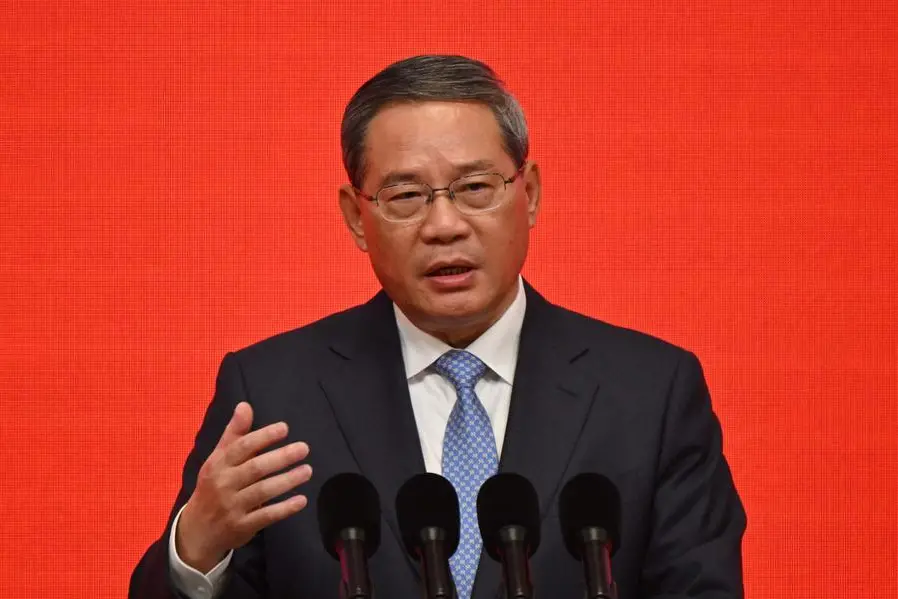PHOTO
China's Premier Li Qiang will travel to Australia this weekend on the highest-ranking visit in seven years, Canberra announced Tuesday, as the two nations' trade ties improve despite their strategic rivalry in the Pacific.
Li's four-day trip, which begins Saturday, comes after Beijing lifted most of the trade barriers it had imposed several years ago on Australian exports including coal, timber, barley, and wine.
The Chinese premier's visit "represents another important step in stabilising our relationship with China," Prime Minister Anthony Albanese told a news conference.
"Australia continues to pursue a stable and direct relationship with China, with dialogue at its core," he said.
"Our approach has been patient, calibrated and deliberate: cooperate where we can, disagree where we must and engage in our national interest."
Though trade barriers had been "overwhelmingly" lifted, he called on China to remove remaining "impediments" on Australian lobsters and crayfish.
China slapped trade sanctions on Australia in 2020, angered by Canberra's exclusion of Huawei from its 5G network, new foreign interference laws and its support for an international probe into the origins of Covid-19.
But relations have warmed since Albanese's centre-left government took power in 2022, adopting a less strident diplomatic tone than its conservative predecessor.
Albanese was given a gala welcome to Beijing in November last year, with a smiling President Xi Jinping promising Australia and China could become "trusted partners".
Li will be welcomed with a state lunch and talks with Albanese in Canberra, the prime minister said, with visits to Adelaide and Perth and meetings with business leaders also on the programme.
- 'Unsafe' -
Li is scheduled to visit New Zealand sometime this week before heading to Australia, the first visit to either country by a Chinese premier since 2017.
He will then fly to Malaysia, wrapping up a tour lasting from June 13-20, China's foreign ministry said.
Ministry spokesman Lin Jian told a regular briefing that Li's visit to New Zealand would see him "exchange in-depth views on China-New Zealand relations and international and regional issues of common concern".
The trip to Australia would "enhance understanding and mutual trust, deepen pragmatic cooperation, and jointly build a more mature, stable and fruitful China-Australia comprehensive strategic partnership," he said.
Despite the detente on trade with China, Australia has tightened its defence alliance with the United States as it seeks to parry Beijing's expanding diplomatic and military influence in the Pacific region.
In a sign of the tensions, Australia has accused Chinese forces of "unsafe and unprofessional" conduct in deploying sonar near its naval divers in the East China Sea in November and firing flares in the path of a naval helicopter last month over the Yellow Sea.
Asked what he would say to Li about the actions, Albanese said: "The message will be that they were inappropriate."
China says it acted lawfully in both incidents, accusing Canberra of trying to provoke trouble.
In the South Pacific, Canberra and Washington have been jolted into strengthening their ties with island nations since Beijing signed a secretive security deal with Solomon Islands in 2022.
The Pacific Islands, while small in population, are replete with natural resources and sit at a geostrategic crossroads that could prove vital in any military dispute over Taiwan.
Australia also supports the United States and Asian countries in opposing Beijing's sovereignty claims over the South China Sea.
And it has provoked Chinese ire by joining a landmark Australia-UK-US defence agreement, AUKUS.
The accord, announced in September 2021, notably aims to supply Canberra with a fleet of stealthy nuclear-powered but conventionally armed submarines to patrol the region's waters.
Australia hopes to have eight nuclear-powered vessels in the water by the 2050s -- a mix of the new AUKUS-class subs built at home and in the UK, and Virginia-class vessels purchased from the United States.
In a national defence strategy unveiled in April, Canberra said the submarines were at the heart of a higher-spending policy aimed at protecting the island continent's trade and access to air and sea.





















